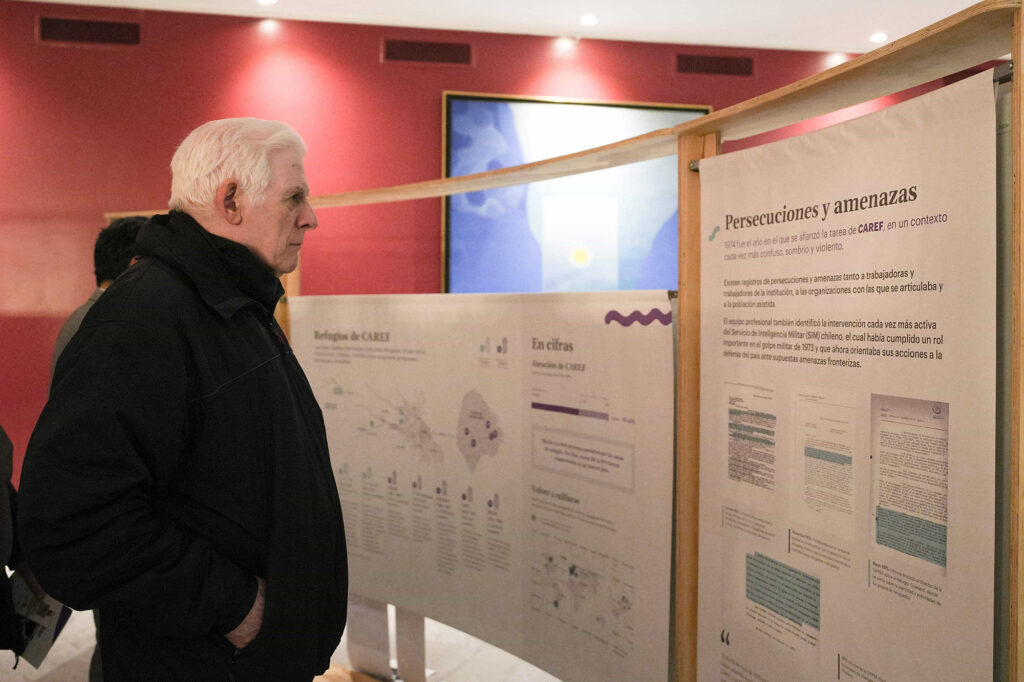
PH @ivanrodriguezalauzet
ARGENTINA-
After researching the documents that make up its Historical Archive, the Argentine Commission for Refugees and Migrants, CAREF, found a complete list of the 19 people who were abducted from one of their houses of refuge in 1976 and arbitrarily detained in Campo de Mayo, four days after the coup d’état in Argentina. This event, which had already been mentioned in the framework of the “Megacausa Campo de Mayo” from the testimony of one of the victims, had not been possible to document until today.
CAREF opened its doors in October 1973 to receive and give asylum to 16,000 exiles from the region, mainly from Chile. Thanks to the support of the United Nations Refugee Agency, UNHCR, and the World Council of Churches, CAREF managed to administer 7 houses of refuge and various hotels in the city of Buenos Aires and the northwest region of the Buenos Aires suburbs, with the aim of guaranteeing housing, food, education and health for almost all the people and families assisted between 1973 and 1989.
One of those houses was located in the former Lutheran Faculty of Theology, in Jose C. Paz, Province of Buenos Aires. From there, as part of a military operation, 19 refugees, as well as a shelter worker and the Executive Secretary of CAREF, Pastor Armin Ihle, were kidnapped and arbitrarily and illegally detained: first in the San Miguel police station and then transferred to Campo de Mayo, where, according to other documents in the institutional Historical Archive, they remained for 11 days. Once released, all these people – mainly families with children and adolescents – were resettled in third countries thanks to the collaboration of CAREF.
Of all the victims of that operation, only one of them gave testimony in the framework of the “Megacausa Campo de Mayo”; of the rest, only three have open files due to the processing of reparation laws and are included in the Unified Registry of Victims of State Terrorism.
The document with the complete list of victims, together with an inventory of files related to illegal detentions in the context of state terrorism, was handed over to the National Archive of Memory (National Secretariat for Human Rights) on Thursday 21 September.
Testimony of Juan Hantke, one of the Chilean citizens detained in the operation at the Lutheran Faculty of Theology, as part of the sentence in the Campo de Mayo mega-case:
(…) he said that one Sunday, he believes on 28 March 1976, an armed group with machine guns entered the university premises and took him and nineteen other people away. There were men, women and children. He clarified that they searched all the rooms, looked for papers and even without finding anything they took them to a detachment and that the armed personnel and the police were still there. He said that they were kept outside on the concrete, that it was very cold and that they were constantly pointed at. He said that they kept him there all night to tell him something, that they beat him there and that they pointed machine guns at them.
He recalled that they were then taken to Campo de Mayo and kept hooded with a bag and tied at the back. That he heard, during the nights, that they beat someone and that once someone was bitten by a dog that was there. He said that they were given something to eat that was very salty and that they heard aeroplanes and among themselves they told them that they were going to take them to Bolivia or throw them into the sea.
He stated that in that place they did not clean themselves and that when they went to the bathroom they were taken with a machine gun; that after a few days they were tied up tightly by the hands and put on a truck; that he tried to untie himself but they discovered him and kicked him. He stated that from there they were taken to a police station in San Miguel where they were made to sign papers and that when he wanted to read what he was signing they told him “No, don’t read anything”. There they were kept in a very small room with many people, fed only once and the bathroom was disgusting.
He added that he was then taken to Migrations – where he could see – and through the United Nations they were able to release him after 18 or 19 days of being held hostage. Once released, he was able to speak to his father and learned that his brother Roberto Hantke had been found dead with several bullets in his body. He recalled that later, through the intermediary of the Red Cross and without any documents, he was able to leave the country with his family for Canada.
“Megacausa Campo de Mayo”, Case n° 3005 (FSM 27004012/2003/TO 10) and accumulated, grounds for judgement of 15 September 2022, TOF 1 San Martín.
About CAREF
The Argentine Commission for Refugees and Migrants, CAREF, was founded in 1973 by a group of historic Protestant churches in Argentina with the objective of receiving and assisting the first contingents of exiles fleeing mainly from Chile, Uruguay, Paraguay and Brazil.
In this half century of existence, CAREF’s work has kept pace with the changing political, social and economic contexts. Today, CAREF provides free professional services of advice, guidance, social and legal assistance; training workshops on issues related to the exercise of the rights of migrants and refugees for relevant social actors and for migrants themselves; and at the same time it promotes actions that allow the definition of state policies aimed at guaranteeing rights.
The image corresponds to the exhibition “Opening the Doors” which will be on display until 28 September at the National Memory Archive, located in the Espacio Memoria y Derechos Humanos ex ESMA.
